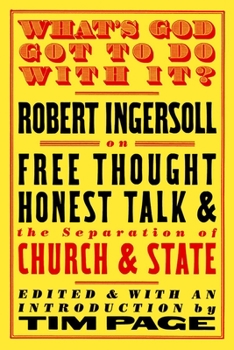What's God Got to Do with It?: Robert Ingersoll on Free Thought, Honest Talk and the Separation of Church and State
Select Format
Select Condition 
Book Overview
Robert Ingersoll (1833--1899) is one of the great lost figures in United States history, all but forgotten at just the time America needs him most. An outspoken and unapologetic agnostic, fervent... This description may be from another edition of this product.
Format:Paperback
Language:English
ISBN:1586420968
ISBN13:9781586420963
Release Date:August 2005
Publisher:Steerforth Press
Length:144 Pages
Weight:0.34 lbs.
Dimensions:0.4" x 5.0" x 7.5"
Customer Reviews
5 ratings
A must read for all freethinkers!
Published by Thriftbooks.com User , 15 years ago
This book is a must read for all free thinkers who know that organized religion has been a cancer and blight on society ever since its inception! Ingersoll was a true genius!
Excellent introduction to the the writings of Robert G. Ingersoll
Published by Thriftbooks.com User , 16 years ago
This book is a quick read with short chapters. Very logical and intelligently expressed. Ingersoll was a man ahead of his time. After readig this, I will certainly look for more of his writings.
Ingersoll, where have you gone?
Published by Thriftbooks.com User , 16 years ago
This brief selection of Robert Ingersoll's writing is one which I would repeatedly pick up to read an essay, put it down and walk away, and read some more the following day. No, it was not that bad, it was, in fact, that good. I felt the need to read it over a week's time rather than finish it in one sitting on a quiet afternoon, which easily could be done, so that the words had time to soak in. Ingersoll, though he wrote over a century ago, gives modern readers a great deal to think about. Truly, it is easy to forget that these works are not contemporary, as the issues he speaks about are still relevant, and perhaps even more so now. It is not until he mentions things such as workers earning three dollars a day that we are reminded of our distance in time, if not in character and predicament. It also reminds us of how desperately our country needs an Ingersoll today. Ingersoll was a pragmatic agnostic and an incredible moral thinker. Then, as now, his skepticism kept him from reaching high political office. Readers will find that his reasoning is sound and powerfully convincing while his language remains approachable but still with its own inspirational beauty: "You cannot be so poor that you cannot help somebody. Good nature is the cheapest commodity in the world; and love is the only thing that will pay ten per cent to borrower and lender both. Do not tell me that you have got to be rich! We have a false standard of greatness in the United States. We think here that a man must be great, that he must be notorious; that he must be extremely wealthy, or that his name must be upon the putrid lips of rumor. It is all a mistake. It is not necessary to be rich or to be great, or to be powerful, to be happy. The happy man is the successful man. Happiness is the legal tender of the soul. Joy is wealth." (Ingersoll 1877) I cannot recommend this book strongly enough to anyone who is concerned with the state of America and its constitution, church and state relations, child abuse, and various other issues. Ingersoll reveals even the ridiculousness of today's political debates, where a candidate's faith is often more important than their political platform. Tim Page's introduction is informative and places Ingersoll's works in their historical and modern context. Also, Page has edited some of Ingersoll's essays, but not to their detriment. And really, at ten dollars (almost four days pay in Ingersoll's time, but probably less than an hours work for you), how can you go wrong?
A must read for all Americans who care about the constitution
Published by Thriftbooks.com User , 17 years ago
If only more people had the guts to put the defense of the constitution ahead of their personal desires this country would be great forever. Robert Ingersoll is one of the greatest Americans of all time, and his words should be studied in every history class in America. Why aren't they? I will let you figure that out.
Short fast intro to Robert Ingersoll; whom I wish were around today
Published by Thriftbooks.com User , 18 years ago
At only 130 pages or so - and short ones at that, this is not some massive tome by a guy who wrote 120 years years ago in flowery 19th century language that will sit on your shelf gathering dust. You can chew this up in an afternoon - or a few afternoons, if you'd like to savor it more. And it's completely readable prose - no archaic Victorian language here. In fact, the main thing that makes one realize that this book isn't contemporary writing is the lack of cynicism and snarkiness aimed at the other side; religious zealots that want to insert God into public policy, law, education and so on. There's no bitterness here, no anger at what has been lost or could be lost in our society if we overthrow rational thought, enlightenment and science over for any 2000 year old magic book. Ingersoll's points about why God is not mentioned in the US Constitution and why that was such a bold important step in the evolution of society is something that I wish every fundamentalist in America would read and consider. Tim Page's non-sycophantic intro to Ingersoll is also well-done, pointing out how remarkable he was, even if his writings never produced the single polished gem that might have kept his works known a little more in the early 21st century. It's a valuable book for any freethinker in America today; cheap, and well put together. Highly recommended.





